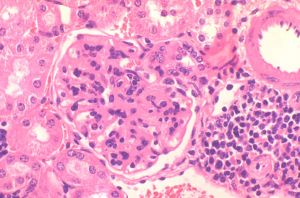Many autoimmune diseases are characterized by autoreactive B lymphocytes, that is, cells that attack self antigens and can damage the individual’s tissues. Our immune system has various means of eliminating these autoreactive cells, which can cause autoimmune diseases such as systemic lupus erythematosus, rheumatoid arthritis, diabetes and multiple sclerosis.
A report published today in the journal Nature Immunology shows that the micro-RNA 148a (miR-148a) is a key regulator in this process. According to the study, increased expression of this miRNA facilitates survival of autoreactive B lymphocytes, which should be eliminated, and thus triggers lupus development.
The work was carried out by researcher Alicia González Martín of The Scripps Research Institute (USA), together with scientists at Yale University (USA) and the Centro Nacional de Biotecnología (CNB-CSIC).
Micro-RNAs are small RNA molecules (19 to 23 nucleotides) that are able to regulate the expression of certain target genes. To do this, they bind to complementary sequences in the messenger RNA and induce its degradation, and protein is not produced. This study shows that miR-148a controls the expression of three important proteins that regulate B cell tolerance and prevent autoimmunity: Bim, PTEN and GADD45a.
"Previous studies showed a significant increase in miR-148a expression in B lymphocytes from lupus patients, but no causal relationship was found between this increased expression and disease development. We also did not know the mechanism by which miRNA could influence its development. This is the first study to describe how a miRNA controls the process of eliminating autoreactive B cells," explains Jesús M. Salvador, CNB-CSIC researcher and one of the authors.
"The preventive role of Bim and PTEN proteins in autoimmunity was already known in the field. This study is the first to identify the role of the GADD45a autoimmunity suppressor gene in controlling B cell central tolerance. Mice with a deficiency in this protein spontaneously develop a disease similar to systemic lupus erythematosus." emphasizes Salvador.
In this study, when miR-148a expression was increased in a mouse model of lupus –which is also frequent in patients with lupus erythematosus or rheumatoid arthritis– development of the autoimmune disease was accelerated and caused premature death in the mice. According to the authors of the article, "insights into the mechanisms that control self-tolerance might lead to new strategies for the treatment of autoimmunity."
- Alicia Gonzalez-Martin, Brian D Adams, Maoyi Lai, Jovan Shepherd, Maria Salvador-Bernaldez, Jesus M Salvador, Jun Lu, David Nemazee & Changchun Xiao. The microRNA miR-148a functions as a critical regulator of B cell tolerance and autoimmunity. 22 February 2016; doi:10.1038/ni.3385






